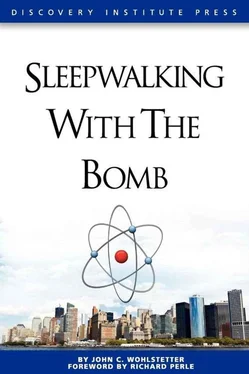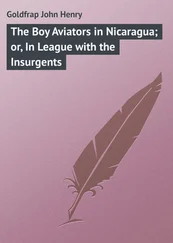John Wohlstetter - Sleepwalking with the Bomb
Здесь есть возможность читать онлайн «John Wohlstetter - Sleepwalking with the Bomb» весь текст электронной книги совершенно бесплатно (целиком полную версию без сокращений). В некоторых случаях можно слушать аудио, скачать через торрент в формате fb2 и присутствует краткое содержание. Город: Seattle, Год выпуска: 2012, ISBN: 2012, Издательство: Discovery Institute Press, Жанр: История, military, Политика, Публицистика, на английском языке. Описание произведения, (предисловие) а так же отзывы посетителей доступны на портале библиотеки ЛибКат.
- Название:Sleepwalking with the Bomb
- Автор:
- Издательство:Discovery Institute Press
- Жанр:
- Год:2012
- Город:Seattle
- ISBN:978-1-93659-906-6
- Рейтинг книги:3 / 5. Голосов: 1
-
Избранное:Добавить в избранное
- Отзывы:
-
Ваша оценка:
- 60
- 1
- 2
- 3
- 4
- 5
Sleepwalking with the Bomb: краткое содержание, описание и аннотация
Предлагаем к чтению аннотацию, описание, краткое содержание или предисловие (зависит от того, что написал сам автор книги «Sleepwalking with the Bomb»). Если вы не нашли необходимую информацию о книге — напишите в комментариях, мы постараемся отыскать её.
RICHARD PERLE, Resident Fellow, American Enterprise Institute and Assistant Secretary of Defense, 1981–1987 Sleepwalking with the Bomb
Sleepwalking with the Bomb — читать онлайн бесплатно полную книгу (весь текст) целиком
Ниже представлен текст книги, разбитый по страницам. Система сохранения места последней прочитанной страницы, позволяет с удобством читать онлайн бесплатно книгу «Sleepwalking with the Bomb», без необходимости каждый раз заново искать на чём Вы остановились. Поставьте закладку, и сможете в любой момент перейти на страницу, на которой закончили чтение.
Интервал:
Закладка:
Soviet leaders were hardly immune to mirror-imaging fallacies—that is, the assumption that one’s opponent behaves like oneself. Riding in Los Angeles during his 1959 visit to America, Khrushchev spotted a sign held up by a woman protesting the Hungarian revolt, brutally suppressed by the Soviets in 1956. The sign read: “Death to Khrushchev, the Butcher of Hungary.” Khrushchev angrily turned to American UN Ambassador Henry Cabot Lodge: “Well, if Eisenhower wanted to have me insulted, why did he invite me to come to the United States?” Lodge was incredulous at this question, but Khrushchev persisted: “In the Soviet Union, she wouldn’t be there unless I had given the order.” This was no idle boast. Dean Rusk, secretary of state during the Kennedy and Johnson administrations, recounted how during a demonstration in front of the U.S. Embassy in Moscow, a staffer asked a Russian soldier how long it would last. The Russian glanced at his watch and replied: “Sixteen minutes.”
It would take the end of the Cold War to relieve much public anxiety about nuclear arms races that had in fact long since ended. What is remarkable to anyone who lived through the height of the Cold War was how little a splash the New START strategic arms treaty of 2010 made in the public imagination. There were, by then, even scarier prospects than that of superpower nuclear war.
The question pending after the ratification of New START is not one of war between Russia and America. Russia never did want a direct shooting war with America, and throughout the Cold War fought hot wars by proxy only. Dangers elsewhere—proliferation in North Korea, Iran’s nuclear quest, a potential Islamist takeover in nuclear-armed Pakistan—are unaffected by New START. History simply fails to support the hope expressed by President Obama and Secretary of State Hillary Clinton that we are furthering nuclear arms control elsewhere by setting an example with our own reductions. With America’s huge arsenal dramatically shrunk and its needed modernization stalled, other powers large (Russia, China) and small (Pakistan, North Korea, Iran) cheerfully ignore us.
5.
IRAN AND THE MIDEAST: SLIDING TOWARDS NUCLEAR WAR
Our dear Imam [Khomeini] ordered that the occupying regime in Al-Qods [Jerusalem] be wiped off the face of the earth. This was a very wise statement. The issue of Palestine is not one on which we could make a piecemeal compromise…. This would mean our defeat. [Anyone who recognizes Israel] has put his signature under the defeat of the Islamic world.
IRANIAN PRESIDENT MAHMOUD AHMADINEJAD, “WORLD WITHOUT ZIONISM” CONFERENCE, 2005IRAN’S QUEST FOR NUCLEAR WEAPONS IS WIDELY ACKNOWLEDGED throughout the West, after disclosure in late 2011 that Iran has pursued components of advanced nuclear weapons and has gotten the help of a renegade Russian weapons designer. A February 2012 inspection report compiled by the UN’s International Atomic Energy Agency found that Iran had conducted high explosive and detonator tests for a nuclear warhead, as well as computer modeling of a nuclear warhead core, in a facility whose suspect activities were detected by satellite surveillance. In February 2012 Iran installed higher-speed centrifuges at its Fordo facility in order to more rapidly enrich uranium that could fuel an atom bomb; the facility is buried more than 200 feet in solid rock, and may be impregnable to attack from the air using presently available conventional munitions—even by the United States.
This march towards nuclear weapons status—the most dangerous proliferation development in the post–Cold War era—highlights the importance of a Third Lesson of nuclear-age history: REVOLUTIONARY POWERS CANNOT BE CONTAINED; THEY MUST BE DEFEATED.
Iran’s Nuclear Quest
SITUATED ON the eastern side of the volatile Mideast, Iran menaces traffic passing through the Strait of Hormuz, 34 miles long and at its narrowest (“choke-point”) 21 miles wide, yet deep enough to handle super-tankers. Through its waters pass 15.5 million barrels of crude oil daily, about one-sixth of global daily oil consumption. Iran has threatened to close off the waterway, which could plunge the global economy into a deep recession. Were Iran a nuclear power, military options against it would virtually vanish.
The shah of Iran pursued a commercial nuclear power program in the 1950s, under President Eisenhower’s Atoms for Peace plan. But few doubted that the shah desired a nuclear weapons capability; the program was suspended when the shah’s regime fell in early 1979. Iran began a clandestine nuclear program in 1984. The Nonproliferation Treaty allows peaceful nuclear activity—commercial power and research, provided the country accepts safeguards and monitoring. A clandestine program makes sense only if its objective is to develop nuclear weapons .
According to investigative reporter Kenneth Timmerman, by 1991 nuclear-club member China was aiding Pakistan, North Korea, and Iran. One Iranian official publicly stated that Iran “was keeping its options open.” The feckless efforts to confront Iran over its nuclear program were perhaps best summed up that year by a comment from a German foreign ministry official. He responded to the Iranian official’s comment: “If you are a piano player, keeping your options open means you are practicing.”
The apparently successful 2010 Stuxnet worm—a malicious self-replicating program that spreads itself, computer to computer, throughout a network—inflicted considerable mechanical damage at key Iranian nuclear facilities. It cost Iran’s uranium enrichment program an estimated year. This cyber-sabotage was presumably the work of either Israel or the U.S. (or both).
But Iran is closing in on nuclear weapons capability. Specific and reliable intelligence as to when it will be ready to cross the nuclear threshold is nearly impossible to acquire. Those whose job it is to determine this have revised, even reversed, their assessments. The historical record shows that more often than not intelligence fails to predict when closed societies will acquire nuclear capability or test a nuclear device, the task being an exceedingly difficult one under the best of circumstances (see chapter 9).
Historical Parallels
IRAN’S DETERMINATION to develop nuclear weapons is the most dangerous proliferation development in the post–Cold War era (Pakistan’s ascendancy to nuclear membership was all but complete by 1984). Complicating efforts to confront the threat posed by a nuclear Iran are two factors:
1. Lack of a fully effective missile defense screen for Western nations within the potential reach of an Iranian arsenal.
2. Lack of confidence that Iran’s leaders will be as effectively deterred from starting a nuclear war as was the Soviet Union during the Cold War (and as are Russia and China today).
The U.S. failure to deploy an effective missile defense against a small-power attack is a product of superpower arms control. Arms-control constraints began with offensive missile systems. That approach changed in 1972, when the Antiballistic Missile Treaty severely limited missile defense design and deployment in the United States. Defensive system design since then has aimed not for the best products that technology and innovation can produce. Rather, system design has been governed by the maximum technological result deemed permissible under strategic arms-control principles as they have been narrowly interpreted since 1972. The result has been systems of perilously stunted capability.
The risks of a nuclear Iran getting into a war can be illustrated by historic examples: the two world wars and the 1962 Cuban Missile Crisis. World War I shows how great powers can be drawn into utterly unanticipated suicidal carnage for failure to understand the real risks of a major conflict. World War II is an example of a war started in part because of efforts to appease rather than confront tyrants with Napoleon’s ambition for conquest, though far more brutal than Napoleon. The Cuban episode shows how a great-power gamble can lead to the brink of total catastrophe. All these elements can be in play if Iran goes nuclear.
Читать дальшеИнтервал:
Закладка:
Похожие книги на «Sleepwalking with the Bomb»
Представляем Вашему вниманию похожие книги на «Sleepwalking with the Bomb» списком для выбора. Мы отобрали схожую по названию и смыслу литературу в надежде предоставить читателям больше вариантов отыскать новые, интересные, ещё непрочитанные произведения.
Обсуждение, отзывы о книге «Sleepwalking with the Bomb» и просто собственные мнения читателей. Оставьте ваши комментарии, напишите, что Вы думаете о произведении, его смысле или главных героях. Укажите что конкретно понравилось, а что нет, и почему Вы так считаете.












